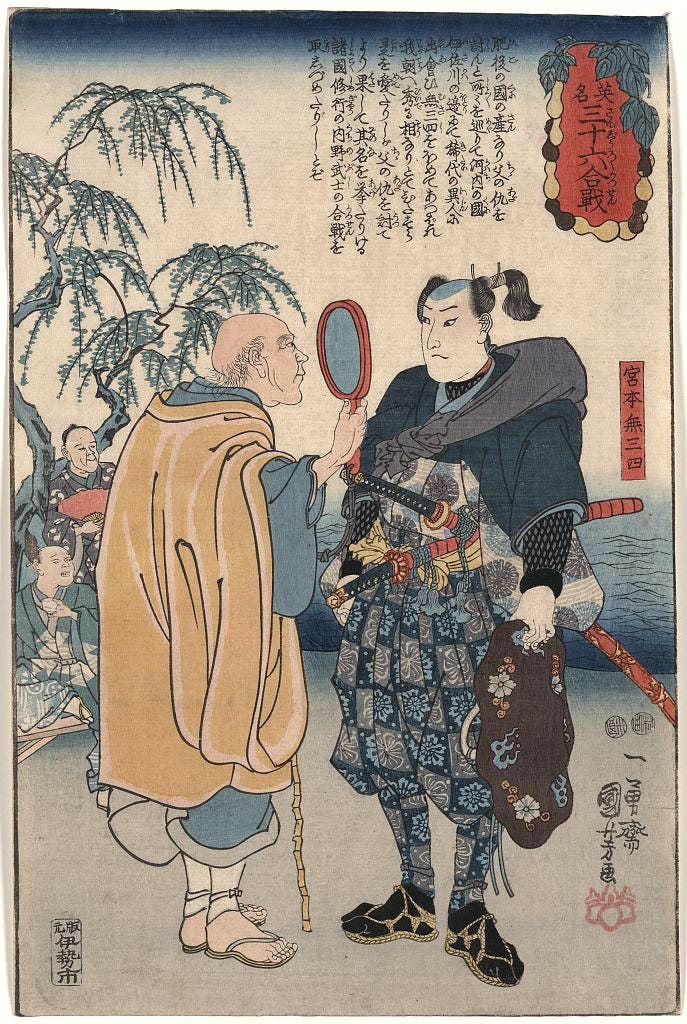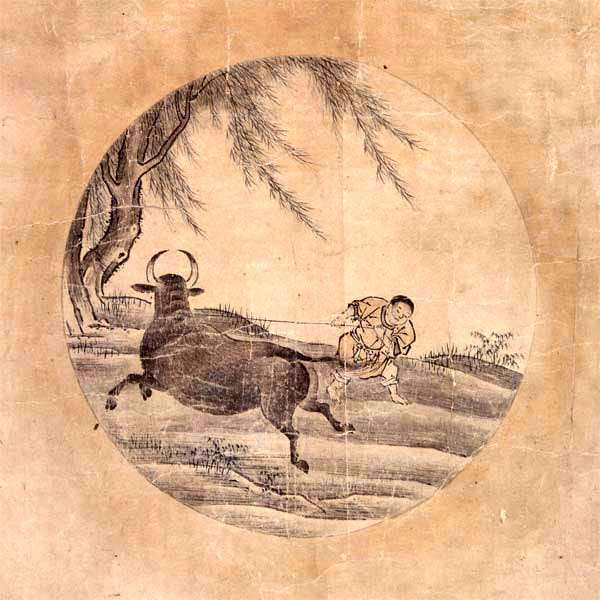The Problem of “I”
or, How the Ego must serve something greater
The Warrior Without A Master
The next figure the we encounter in The Tree J. Marvin Spiegelman’s journeys in active imagination, is known as the Ronin. This Japanese term refers to a Samurai (commonly translated as “warrior,” but more literally translated as “servant”) without a master. A Samurai would typically become a Ronin (from “ro” meaning “wave,” and “nin” meaning “man,” signifying a wanderer) after the death of his master.
It is difficult to overstate the importance of relationships in traditional Japanese society. Having no one to serve led many Ronin to become outlaws; though others like the author Miyamoto Musashi would take up respected careers as duelists.1
Our Ronin, however, did not lose his master to death. He is a dedicated student, so when his Master teaches all that he can, he sends him off to find another. He does, learning all that he can once more, and the cycle repeats, until our Ronin has perfected his skill. But this leads to a troubled relationship with his former Masters.
It came to pass, however, that when I returned to my ancestral home, I was honored, but deceived. My skill and talent were beyond question, but my former Masters grew old and narrow. They were jealous, it seemed, of what I had accomplished and were in fear of losing their power. As it is, sometimes, with the old who cannot bend gracefully, they turned ever more rigid… In time, pupils came to seek me out as a Master.
The Elders, perhaps rigid and jealous, or perhaps seeing something else, refuse to grant the title of Master. So our guide becomes a Ronin, wandering without a Master. In time, the Ronin recognizes the grain of truth in their decision; that he has become master of his sword, but not master of himself. He sees that he is attached to fame, recognition, and power. The Ronin then retreats into the forest to confront himself without distractions.
The Role of the Ego in the Mind
The reader may be familiar with how Sigmund Freud refers to the Ego, along with the Id and Superego, as one of three parts of the psyche. To Freud, the Ego is the rational actor that negotiates between the wild, animalistic Id and the higher morality of the Superego.
One earlier article briefly explored the differences leading to the split between Sigmund Freud and Carl Jung:
In Jung’s work (and in much of contemporary psychology) the Ego is different than Freud’s moderator. In a vastly more complex unconscious Self, filled with various interacting archetypes, the Ego is that which can refer to and understand itself.
In a simpler example, to paraphrase Psychology Today, when you think, “I think I will enjoy reading the Mythic Journeys blog,” the “I” that is speaking is the Ego. This definition is a perennial one, as “ego” is the Latin equivalent of the first-person pronoun “I.”2
It is typical in our society to view Ego as a bad thing, at least in excess. Interpersonally, too much Ego can make one narcissistic, concerned only with the “I” and not with the “you, we, or they.” Internally, a fixation on the Ego can lead one to believe that they have far more control over themselves than is true, as the “I” which speaks is so often unaware of the unconscious forces at play behind the scenes.
Through active imagination, Spiegelman is able to confront the Ego and (as is a Jungian pattern) attempt to integrate it into the greater Self. As Jung writes in Man and His Symbols, the Ego has an important role to play:
It is the ego that serves to light up the entire system, allowing it to become conscious and thus to be realized. If, for example, I have an artistic talent of which my ego is not conscious, nothing will happen to it. The gift may as well be non-existent. Only if my ego notices it can I bring it into reality.
Our imagined Ronin is aware of the problems of the Ego, but does not yet know how to make it find its place. This realization brings him to leave his society, so that not even his Ego will be his master.
Why the Ego Cannot be Eliminated
When our Ronin leaves for the isolation of the forest, it is to control his Ego. It is a powerful beast, like an ox that he desires to subdue or tame. But the closer he comes to achieving this goal, the more it appears impossible.
Even without pupils and Masters, the Ronin is still present. While others cannot praise his work, he still can. Even saying, “I am going on a forest retreat to eliminate my Ego,” is impossible without an “I.” As long as he lives, the Ronin has an Ego; even if he were to end his life, the Ego would be the one holding the blade.
The Ronin wrestles with his Ego like one trying to capture an ox. It is both mighty and capable, but what will happen if he captures it?3
The Ronin can let go of his desire for fame, he can let go of his desire for recognition, but he cannot let go of the one who desires. Even if the Ronin can control the mighty beast of his Ego, it will still be ever-present.
Our next blog post will follow the Ronin’s story to its conclusion, wherein he resolves this paradox and finds his own symbol on the Tree of Life.
Image: Miyamoto Musashi having his fortune told from “Thirty-six Famous Battles” by Utagawa Kuniyoshi
The capitalization of “Ego” in the psychological context is due to its status as a proper noun. The Latin “ego” is left lower-case due to Latin’s lack of pronoun capitalization, as opposed to the English first-person “I” or the German third-person-formal “Sie.” Perhaps a clever blogger could explore pronoun capitalization across languages; if that is you, send me a link to your work!
Image: Catching the Bull from Kuoan Shiyuan’s Ten Bulls, illustrated by Tensho Shubun





Interesting stuff! Makes me think of concepts like "self-awereness" and Free Will as well. Increasing your self-insight, as well as aligning your own Will with True Realities over time, as the best long term strategy. Either way, knowing and managing your own Ego is an important thing! And indeed - without something greater or a bigger context, it might not even be possible.